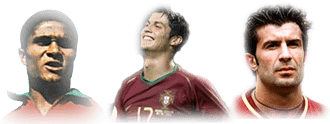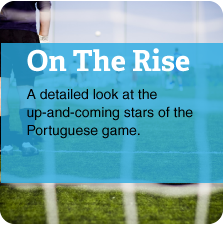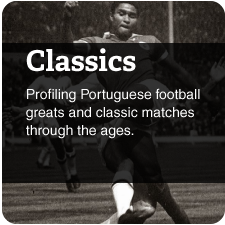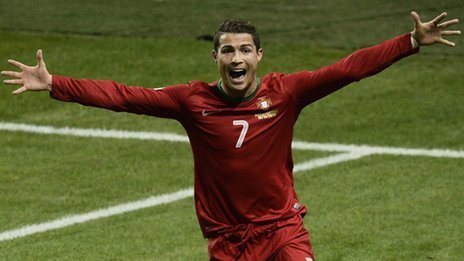 “I’ve never made it a secret I aim to be the best.” It is one of Cristiano Ronaldo’s most famous quotes. When it comes to the Seleção, at least, mission accomplished. The Madeira-born phenomenon has obliterated all records for Portugal’s national team, long ago rendering redundant comparisons with the forever revered Eusébio as regards the country’s greatest ever footballer.
“I’ve never made it a secret I aim to be the best.” It is one of Cristiano Ronaldo’s most famous quotes. When it comes to the Seleção, at least, mission accomplished. The Madeira-born phenomenon has obliterated all records for Portugal’s national team, long ago rendering redundant comparisons with the forever revered Eusébio as regards the country’s greatest ever footballer.
PortuGOAL charts the international timeline of a living Seleção legend, the relationships with coaches that shaped his output in a Portugal shirt and the numerous occasions when Ronaldo has taken it upon himself to beat the opposition single-handedly.
Ronaldo has just reached the landmark number of 100 goals for his country, and the story is not over yet. This article will be updated as the Portugal captain continues to build on an astonishing legacy.
2003: The Perfect Platform
Ronaldo made his senior debut for Portugal as a second-half substitute in a friendly international against Kazakhstan in Chaves on 20 August 2003. His bow for the full national side came just a fortnight after playing another friendly, which would become an important marker in Ronaldo’s fledgling career. A mesmerising display of wing wizardry for Sporting against Manchester United in pre-season at the newly inaugurated José Alvalade Stadium resulted in United’s players pleading with manager Alex Ferguson to sign him. He did, and the Scot and Portuguese would go on to form a father-son-like relationship. The Seleção were coached at the time by Brazilian Luiz Felipe Scolari, with whom Ronaldo would also form a close bond. Such is Ronaldo’s iron will to succeed and relentless ambition, it is likely he would have triumphed whoever had coached him in those early years, but having two such strong-minded coaches watching his back and carefully nurturing his development represented a good head-start.
Euro 2004: Bang! A Star Is Born
Ronaldo’s competitive debut came at the 2004 European Championship, staged in Portugal. The then 18-year-old gave away a penalty five minutes after coming on as a second-half substitute against Greece as the hosts fell to a shock 2-1 defeat in the tournament opener, although it was Ronaldo who scored the late consolation goal, rising well to head in a corner. Those 45 minutes were enough to persuade Scolari that Ronaldo already belonged at this level. Barring injury or rest, over the next 15 years Ronaldo would never again fail to feature in Portugal’s starting line-up.
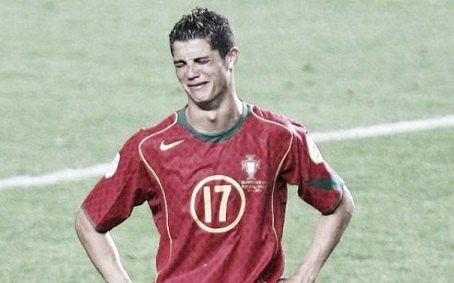 A rough diamond Ronaldo may have been, but a diamond nonetheless, as dazzling displays throughout the competition helped the hosts recover from their bad start and reach the final. Ronaldo scored his spot kick in the quarter-final penalty shootout victory against England and netted in the 2-1 semi-final win against the Netherlands. The tournament would end in heartbreak for Portugal with defeat against Greece again, leading to the famous photographs of Ronaldo crying inconsolably on the pitch. However, with two goals and two assists at Euro 2004 and voted into the team of the tournament, the Manchester United youngster had announced himself on the international stage.
A rough diamond Ronaldo may have been, but a diamond nonetheless, as dazzling displays throughout the competition helped the hosts recover from their bad start and reach the final. Ronaldo scored his spot kick in the quarter-final penalty shootout victory against England and netted in the 2-1 semi-final win against the Netherlands. The tournament would end in heartbreak for Portugal with defeat against Greece again, leading to the famous photographs of Ronaldo crying inconsolably on the pitch. However, with two goals and two assists at Euro 2004 and voted into the team of the tournament, the Manchester United youngster had announced himself on the international stage.
World Cup 2006: Continued Ascension
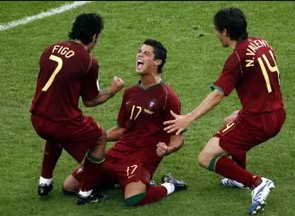 With Luís Figo initially retiring during the qualifying campaign for World Cup 2006, Ronaldo took the mantle as the team’s most important player. He struck seven goals as Portugal strolled through qualification, the standout performance being a brace in the 7-1 demolition of Russia in Lisbon at the same Alvalade stadium where he had shone for Sporting against Manchester United a little over a year earlier to earn his move to the English giants.
With Luís Figo initially retiring during the qualifying campaign for World Cup 2006, Ronaldo took the mantle as the team’s most important player. He struck seven goals as Portugal strolled through qualification, the standout performance being a brace in the 7-1 demolition of Russia in Lisbon at the same Alvalade stadium where he had shone for Sporting against Manchester United a little over a year earlier to earn his move to the English giants.
Ronaldo would go on to play a starring role in Portugal’s most successful World Cup since 1966. With Figo back in the fold, Portugal had flair in abundance with Ronaldo, Deco and Simão Sabrosa contributing to a flamboyant run to the semi-finals, where the Seleção went down to a narrow 1-0 defeat by France. Portugal were voted the most entertaining team at the tournament by the fans in a FIFA.com poll.
Boulahrouz’s hatchet job and Rooney wink-gate
Two successive matches in the knockout phase gave rise to what would become a feature of Ronaldo’s career in a Portugal shirt: no matter what he did in football terms, he would be the main story, often through no fault of his own.
In the last-16 encounter against the Netherlands a crude hatchet job on Ronaldo by Khalid Boulahrouz put an early end to the winger’s participation in the infamous “Battle of Nuremburg” and such was the violence of the “challenge” is was fortunate Ronaldo’s World Cup was not ended there and then. Incredibly, the Dutch player stayed on the pitch. “Of course it should have been a red card. Edwin van der Sar told me that one and a half years later, Ronaldo still had a scar,” admitted Boulahrouz years later.
Thanks to Ronaldo’s remarkable fitness levels and capacity to recover from injuries, just six days afterwards he was in the line-up as Portugal ousted England for the second tournament running at the quarter-final stage in a penalty shootout – Ronaldo dispatching his spot kick with aplomb.
The match would be remembered, however, for an incident that gained Ronaldo a legion of antibodies in the wake of Wayne Rooney’s sending-off for stamping on Ricardo Carvalho’s private parts. Rooney and Ronaldo were team-mates at Manchester United at the time, and the English press savagely pilloried Ronaldo for his role in making sure the referee showed Rooney the red card. His subsequent wink to Scolari sitting on the Portuguese bench was portrayed as the consummation of a Machiavellian plan to remove England’s best player from the equation. Tellingly, there was never any animosity between the two protagonists themselves, with Rooney and Ronaldo speaking after the match and their flourishing partnership on the pitch resuming unabated the following season, with the English forward later conceding he would have acted in the exact same way if he had been in Ronaldo’s boots.
At World Cup 2006, Ronaldo scored one goal only, from the penalty spot against Iran, but gave ample evidence of his superstar quality and was unlucky to miss out on the Best Young Player of the Tournament to Germany’s Lukas Podolski. However, after two superb tournaments for Ronaldo at the beginning of his Seleção career, it would not be until six years later that Portugal’s superstar would impact an international tournament to the same extent.
Euro 2008: Captain CR7
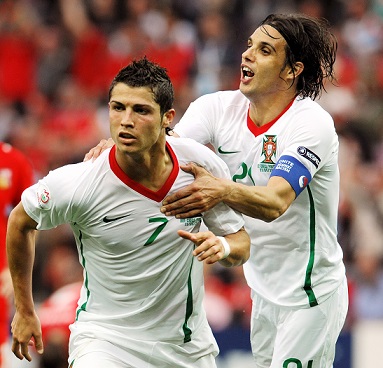 At 22 years of age Ronaldo was made captain of his country and ahead of Euro 2008 his shirt number was changed from No17 to No7. The iconic image of Ronaldo wearing the number seven shirt and the captain’s armband was born. Ronaldo again enjoyed a strong qualifying campaign, netting eight goals and the tournament started well for the Seleção, with comfortable victories over Turkey and the Czech Republic, Ronaldo scoring and assisting in the latter match. But that was as good as it got. With the group won, Scolari rested the captain along with virtually the entire first team for the third group game (a 2-0 defeat to hosts Switzerland), but it did not have the desired effect as Portugal were overpowered 3-2 by Germany in the quarter-finals.
At 22 years of age Ronaldo was made captain of his country and ahead of Euro 2008 his shirt number was changed from No17 to No7. The iconic image of Ronaldo wearing the number seven shirt and the captain’s armband was born. Ronaldo again enjoyed a strong qualifying campaign, netting eight goals and the tournament started well for the Seleção, with comfortable victories over Turkey and the Czech Republic, Ronaldo scoring and assisting in the latter match. But that was as good as it got. With the group won, Scolari rested the captain along with virtually the entire first team for the third group game (a 2-0 defeat to hosts Switzerland), but it did not have the desired effect as Portugal were overpowered 3-2 by Germany in the quarter-finals.
It subsequently emerged that Ronaldo had been playing through injury, and he immediately had an ankle operation that would delay his start to the club season. In what would become a recurring theme, Ronaldo had played through the pain and was in less than ideal physical condition when it came to international summer tournament time.
World Cup 2010: Queiroz Relationship Sours As Ronaldo’s Goals Dry Up
The premature end of Portugal’s participation at Euro 2008 also signalled the end of the Scolari era as national team coach. The Brazilian returned to club football, taking over at Chelsea, and he was replaced by Carlos Queiroz. The appointment of the new Selecionador was initially met with enthusiasm in Portugal, in particular in relation to his potential impact on Ronaldo. Queiroz was credited with playing a leading role in CR7’s spectacular progress at Old Trafford, culminating in him collecting his first Ballon d’Or/FIFA World Player award in 2008. As it turned out, Queiroz’s ultra-defensive game plan for the Seleção proved disastrous for Ronaldo.
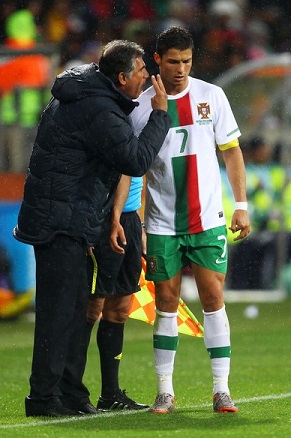 The first three World Cup qualifying games Ronaldo played after recovering from injury – against Sweden home and away, and at home against Albania – all ended 0-0 and were a sign of things to come. Queiroz made Portugal a formidable team from the defensive point of view. The Seleção conceded a miserly 3 goals in 16 matches prior to the 2010 World Cup, and only one in four games at the tournament itself. The problem was it came at a cost. Portugal’s attacking game was completely blunted. The strategy seemed to be: don’t concede and try to score by booting it up to Ronaldo to work some magic. But ploughing a lonely furrow up front, the alchemy had dried up for Ronaldo in a Portugal shirt. In the 18 games Ronaldo played for the Seleção under Carlos Queiroz, he scored just two goals.
The first three World Cup qualifying games Ronaldo played after recovering from injury – against Sweden home and away, and at home against Albania – all ended 0-0 and were a sign of things to come. Queiroz made Portugal a formidable team from the defensive point of view. The Seleção conceded a miserly 3 goals in 16 matches prior to the 2010 World Cup, and only one in four games at the tournament itself. The problem was it came at a cost. Portugal’s attacking game was completely blunted. The strategy seemed to be: don’t concede and try to score by booting it up to Ronaldo to work some magic. But ploughing a lonely furrow up front, the alchemy had dried up for Ronaldo in a Portugal shirt. In the 18 games Ronaldo played for the Seleção under Carlos Queiroz, he scored just two goals.
As Ronaldo trooped off the pitch at Cape Town after Portugal had been knocked out by eventual champions Spain in the round of 16, he was asked why the Seleção had lost. “Ask Queiroz,” he snapped back at the reporter. Four years later, at the 2014 World Cup, now as Iran coach, Queiroz confided that he had been hurt by the insinuation he was the person culpable for Portugal’s downfall in South Africa, and the two of them have not spoken since.
The fallout from Queiroz’s notoriously irascible personality was not restricted to the tetchy relationship between captain and coach. It was mirrored in tensions with other senior players, a spate of premature retirements after the 2010 World Cup (Deco, Tiago Mendes, Simão), and an ugly bust-up with FPF officials during a routine drug testing procedure. An awful start to the 2012 Euro qualifying campaign – a 4-4 draw at home against Cyprus and a 1-0 defeat in Norway (two matches Ronaldo missed through injury) – was the straw that broke the camel’s back and Queiroz was sacked, replaced by Paulo Bento.
The 2010 turning point
Looking at Ronaldo’s Portugal career as a whole, 2010 was a clear turning point. After his initial success for the national team, Ronaldo had failed to replicate his incredible club form for his country. Portuguese fans would see him breaking endless records and scoring goals galore for Real Madrid, but it was different story when donning a Portugal shirt. It is almost unthinkable to recall in the light of what would subsequently come to pass, but it was not infrequent for Portuguese fans to boo Ronaldo when things were going badly during the lean years, and accuse him of not putting in as much effort for his country as for his club, and public debate about his unsuitability as captain of the team was commonplace.
Ronaldo games/goals for Portugal before and after the 2010 World Cup
|
August 2003 – June 2010 |
76 games / 23 goals |
|
October 2010 – September 2020 |
89 games / 78 goals |
That all changed after the 2010 World Cup, and the statistics bring this “before and after” into stark relief. Up to and including the tournament in South Africa, Ronaldo played 76 times for Portugal, scoring 23 goals (a 30% goal per match scoring rate), compared to 78 goals in 89 games (88%) since then (at the time of writing, September 2020). To put it another way, Ronaldo went from scoring under one goal every three matches to scoring over four goals every five matches.
Euro 2012: Ronaldo Bounces Back Under Bento
Paulo Bento had been a former teammate of Ronaldo’s at Sporting and the two of them immediately hit it off. “Paulo Bento the coach is exactly the same as Paulo Bento the player,” said Ronaldo. Tactically, the major change was making sure Ronaldo always had a strike partner instead of playing as a lone man up front, despite Portugal’s lack of high-quality options in that position. Be it alongside Hugo Almeida or Hélder Postiga, the recuperation of the captain’s performances in a Seleção shirt was instant and startling, scoring 7 goals in the 8 remaining qualification games, including a brace in the memorable 6-2 thumping of Bosnia in the second leg of the playoff to book Portugal’s place at Euro 2012.
Ronaldo’s greatest goal that never was
A friendly in Lisbon against reigning World and European champions Spain just a couple of months after Bento’s appointment spoke volumes about the change in mentality in the squad – and Ronaldo. A vibrant, joyful, energetic performance saw the hosts thwack their Iberian neighbours 4-0, and it could have been more if Ronaldo’s greatest ever goal that never was had stood. Picking up the ball in the inside left channel, Ronaldo drove into the box at speed, twisting and turning and leaving a tangled Gerard Piqué sliding on his back side, before producing a ridiculously perfect angled lob over Iker Casillas with the outside of his foot from a standing position just a few yards in front of his club colleague. Unfortunately, Nani running in at the far post got a touch as the ball was bouncing into the net and was ruled offside, and an authentic work of art was invalidated.
Despite Portugal’s marked improvement under Bento, optimism was not in abundance ahead of Euro 2012. The Seleção had been drawn in a tough group alongside Germany, Denmark and Netherlands and a narrow 1-0 defeat against the Germans in the opener lent weight to the predictions of many that Portugal would be coming home early from Ukraine and Poland. A roller-coaster 3-2 win against Denmark set up a decisive all-or-nothing third group match against the Dutch. We were about to witness one of Ronaldo’s incredible shows of football prowess on the biggest stage.
Ronaldo came into the match off arguably his worst ever game for Portugal, having uncharacteristically missed two gilt-edged chances against the Danish. He followed it up with a contender for his best ever. When Rafael van der Vaart put the Netherlands into the lead early on, Portugal were staring at an early exit from the tournament. Ronaldo was having none of it.
Ronaldo rips apart the Netherlands
Stationed primarily in his favoured inside left channel, but with licence to roam into the middle, Ronaldo had the devil in his body that night, terrorising the Dutch defence with his repertoire of scintillating high-speed dribbling, mesmeric footwork, uncheckable off-the-ball movement and lethal finishing. He scored two goals, hit the post twice, brilliantly set up three chances and at the end of 90 minutes the only surprise was that Portugal had won by one goal only.
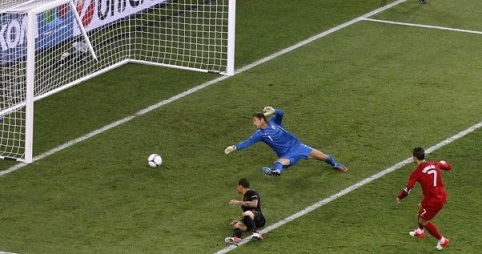 Several headlines around the world the next morning read “Ronaldo 2-1 Netherlands”. It is understandable that the general perception from abroad saw Portugal as Ronaldo and 10 others, although this simplistic viewpoint was more than a little unfair on this occasion given several outstanding displays by the captain’s teammates. It is, however, a perception that was often justified and can be looked upon not as a slur on the rest of the Portugal players, but rather as recognition of the once-in-a-lifetime talent that is Cristiano Ronaldo. What was witnessed on the night of 17 June at the Metalist Stadium in Kharkiv was a genius at work.
Several headlines around the world the next morning read “Ronaldo 2-1 Netherlands”. It is understandable that the general perception from abroad saw Portugal as Ronaldo and 10 others, although this simplistic viewpoint was more than a little unfair on this occasion given several outstanding displays by the captain’s teammates. It is, however, a perception that was often justified and can be looked upon not as a slur on the rest of the Portugal players, but rather as recognition of the once-in-a-lifetime talent that is Cristiano Ronaldo. What was witnessed on the night of 17 June at the Metalist Stadium in Kharkiv was a genius at work.
Another brilliant performance and wonderful diving headed goal against the Czech Republic in the quarter-final set up a semi-final against Spain, who had dominated international football for the last four years. Portugal went out after a tight goalless draw in the penalty shootout, with Ronaldo not getting to take his spot kick. He was down as number five and much of the reaction around the world encapsulated what had now become an institution in itself in the international media – analysing every single decision made by or in relation to Ronaldo through a prism that lent added “evidence” to a preconceived slant. The fact it was portrayed as a selfish decision taken unanimously by Ronaldo to ensure he grabbed the limelight was sadly typical of much of the “analysis” surrounding the global superstar, especially at this time. At no point was being down as fifth in line to take a penalty viewed simply as a decision to enable Portugal’s best player to take what was likeliest to be the most high-pressure spot kick. Nevertheless, you can’t take penalty number five if it’s all over by then. This was acknowledged as a mistake and in subsequent shootouts Ronaldo took his turn earlier.
In the light of the way the Spanish subsequently trounced Italy in the final, it is tempting to speculate that the Seleção were a penalty shootout away from lifting a major trophy for the first time. That quest would go on.
World Cup 2014: Carrying Portugal On His Back
Ronaldo’s ability to carry Portugal was never as evident as during the World Cup 2014 qualifying campaign and tournament. With no Figo, no Rui Costa, and no Deco, the national team was unhealthily reliant on its captain. Paulo Bento’s stubborn selection policy meant a midfield of Miguel Veloso, João Moutinho and Raúl Meireles started every match, regardless of form or fitness. While all excellent players and tireless workers who gave great service to Portugal, it is fair to say imagination and the capacity to surprise was lacking in midfield. With Ricardo Quaresma incomprehensibly ostracised, either Hélder Postiga or Hugo Almeida partnering Ronaldo in attack, and Nani maddeningly inconsistent, more often than not Portugal’s only font of inspiration was CR7.
In a stuttering qualifying campaign, Ronaldo had already bailed Portugal out on a rainy night in Belfast when a shock defeat against Northern Ireland looked on the cards. With an hour played, the Seleção found themselves losing 2-1 and down to ten men following Postiga’s first-half dismissal, but a 15-minute hat-trick from Ronaldo resulted in a 4-2 victory. Even so, dropped points against Northern Ireland in the home fixture, Russia and Israel twice meant Portugal had to negotiate a playoff for the third straight tournament.
One-man show destroys Sweden
It was Sweden who stood between the Seleção and a place in Brazil. In the first leg in Lisbon Ronaldo gave Portugal a narrow lead with a stooping header. At the Friends Arena in Stockholm the captain took it upon himself to see out qualification with a performance for the ages. Early in the second half he latched onto a Moutinho throughball, tore towards the Sweden box and injected such pace into his 20-yard shot that it left Sweden goalkeeper Andreas Isaksson grasping at thin air as the ball hurtled into the net. With a 2-0 aggregate lead and 40 minutes left to play, the Seleção were surely on their way to the 2014 World Cup. Zlatan Ibrahimovic had other ideas and two quick-fire goals from the Swede suddenly meant the hosts were one goal away from destroying Portugal’s Brazilian dream.
As quickly as Ibrahimovic had reignited Sweden’s hopes though, Ronaldo brutally extinguished them. Separated by just two minutes, two more lovely passes, one from Hugo Almeida, the other from Moutinho again, resulted in Ronaldo sprinting clear and showing a superhuman mixture of raw power, coordination and composure to smash two wonderful finishes into the net, one with his left foot, the other with his right. The insatiable and unplayable Ronaldo nearly added to Sweden’s misery, three times more coming close to adding to his personal haul. No matter, Portugal were in Brazil. This match continues to be cited by many Portuguese as Ronaldo’s greatest ever in a Seleção shirt.
No Ronaldo, no party
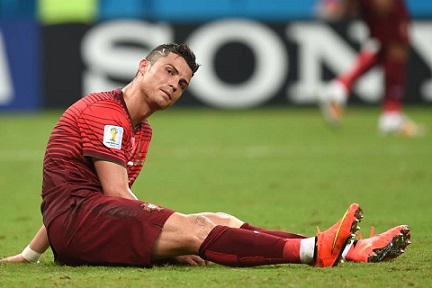 If further illustration was needed that the Seleção were completely Ronaldo-dependent at this time, it came in the tournament itself in Brazil. Ronaldo has admitted that it is a tournament he should never have played in. Indeed, a troublesome patellar tendinitis injury in his left knee had diminished Ronaldo’s physical condition at the end of the club season, but with Real Madrid reaching the final of the Champions League – Ronaldo scoring in a 4-1 triumph against city rivals Atletico in Lisbon – the Portugal captain had not given his body a chance to rest. Despite Real’s pleas for him to sit out the tournament, Ronaldo insisted he would lead his country in Brazil.
If further illustration was needed that the Seleção were completely Ronaldo-dependent at this time, it came in the tournament itself in Brazil. Ronaldo has admitted that it is a tournament he should never have played in. Indeed, a troublesome patellar tendinitis injury in his left knee had diminished Ronaldo’s physical condition at the end of the club season, but with Real Madrid reaching the final of the Champions League – Ronaldo scoring in a 4-1 triumph against city rivals Atletico in Lisbon – the Portugal captain had not given his body a chance to rest. Despite Real’s pleas for him to sit out the tournament, Ronaldo insisted he would lead his country in Brazil.
“If I’d rested my body, I would have recovered,” said Ronaldo months afterwards. “I didn’t want to miss the Champions League final or the World Cup. Sometimes a sportsman has to take his body to the limit, you have to take risks. I forced myself to play. For my club side things went well, for Portugal not so well.”
A visibly diminished Ronaldo in conjunction with Bento’s poorly selected squad, packed with players who were out of form or unfit, resulted in the Seleção crashing out in the group stage. Ronaldo played through the pain, delivering a magnificent cross for Varela to salvage a draw against the USA at the end of a match played in the energy-sapping humidity of Manaus, and scoring the winner against Ghana in the final group game, but it proved not enough. Portugal never recovered from the disastrous 4-0 opening day hammering administered by Germany and went home early.
Euro 2016: “The Happiest Day Of My Career”
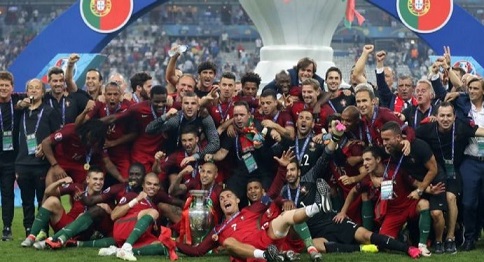 Paulo Bento was considered lucky by many to survive such a poor showing at World Cup 2014, and a shock 1-0 defeat at home to Albania in the first qualifying match for Euro 2016 was the last straw. The FPF sacked Bento and brought in veteran coach Fernando Santos, an appointment that was greeted in lukewarm fashion by the press and public alike. Santos was seen as a safe pair of hands rather than an inspired choice, but in what proved to be a prophetic unveiling press conference he boldly stated: “I’m only interested in winning, winning, winning. The rest is just talk.”
Paulo Bento was considered lucky by many to survive such a poor showing at World Cup 2014, and a shock 1-0 defeat at home to Albania in the first qualifying match for Euro 2016 was the last straw. The FPF sacked Bento and brought in veteran coach Fernando Santos, an appointment that was greeted in lukewarm fashion by the press and public alike. Santos was seen as a safe pair of hands rather than an inspired choice, but in what proved to be a prophetic unveiling press conference he boldly stated: “I’m only interested in winning, winning, winning. The rest is just talk.”
One of Santos’s first decisions was to recall several players who had been jettisoned by his predecessor, one of which was Ronaldo’s great friend and former team-mate at his first club Ricardo Quaresma. And it was the mercurial winger who provided an inch-perfect cross for Ronaldo to head in a stoppage time header in Copenhagen for a vital victory over Denmark to kick-start Portugal’s qualifying campaign. The Seleção reeled off seven straight victories, all by a single goal, to book their place in France. Ronaldo notched five goals, a brilliant 30-minute hat-trick in Armenia the highlight. With Ronaldo apparently in full health, and a seemingly negotiable group, there was a quiet optimism going into France 2016.
What followed is an object lesson of the fine margins between success and failure in football. Portugal outplayed Iceland and Austria in their first two Group F matches, but frustrating draws, especially in the latter match when Ronaldo failed to convert a penalty, meant the pressure was on the Seleção going into the final group match against Hungary.
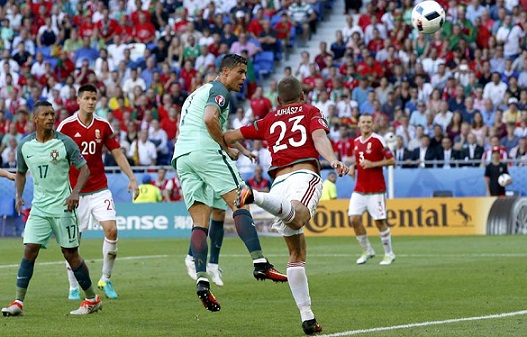 A heart-stopping match followed, with Portugal three times coming back from behind, and thankful for another masterclass from their captain. An inch-perfect throughball to Nani for the first equaliser, the deftest of backheel finishes for the second equaliser and a typically towering header for the third equaliser saw Ronaldo again bail out his country in its hour of need. Portugal had scraped through to the knockout stages and when Quaresma finished off a sweeping counter-attack for a dramatic winner against Croatia in the round of sixteen, following up on a brilliantly saved Ronaldo shot, Portugal fans started to believe something special might be afoot.
A heart-stopping match followed, with Portugal three times coming back from behind, and thankful for another masterclass from their captain. An inch-perfect throughball to Nani for the first equaliser, the deftest of backheel finishes for the second equaliser and a typically towering header for the third equaliser saw Ronaldo again bail out his country in its hour of need. Portugal had scraped through to the knockout stages and when Quaresma finished off a sweeping counter-attack for a dramatic winner against Croatia in the round of sixteen, following up on a brilliantly saved Ronaldo shot, Portugal fans started to believe something special might be afoot.
Poland stood between Portugal and a place in the semi-finals, and another tightly contested match ensued, the Seleção coming through after a penalty shoot-out to set up a last-four encounter against Wales. In Portugal’s most complete performance of the tournament, the result was never in doubt, Ronaldo again taking centre stage by first producing a prodigious leap to head in the opener, then shooting towards goal with Nani’s sliding foot diverting the shot into the net.
Portugal were in the second final in their history. In the first they had been shocked as hosts, against Greece, but to lift the European Championship it was now they who had to produce the shock, as the Seleção went up against the Euro 2016 organisers France.
For all of Ronaldo’s incredible accomplishments thus far, for club and country, it was difficult to pinpoint a truly defining moment to cement his greatness in the world game. The whole of Portugal held its collective breath at kick-off on 10 July 2016, craving for this to be that moment. The game had barely got going and those hopes were in tatters, as described by Nathan Motz in The Thirteenth Chapter:
“… Cristiano Ronaldo was knocked off the ball by Dimitri Payet, a rough but fair challenge that left the Portugal captain clutching his left knee in pain. Despite extensive on-field treatment and two attempts to carry on, Ronaldo finally collapsed to the pitch in tears, the fate of a nation seemingly about to walk off the pitch with him. It was a devastating moment for Portugal’s captain and the Seleção. The TV cameras dramatically captured that anguish etched onto his face, his desperation too intense to bother swiping away a moth that impudently perched on his nose…”
Like all great competitors, Ronaldo did not dwell on his misfortune, sensing he could still be useful to his team. In the mixed zone after the match Cédric confided how Ronaldo had delivered a stirring speech at half time, telling the team they would triumph. During extra time, he stood beside Fernando Santos as an impromptu auxiliary coach, imploring, cajoling and coaxing his team to give every last effort in that famous Paris night. And afterwards, his joy was uncontained.
Months later, footage emerged of his reaction in the dressing room, delivering an epic victory speech before the whole Portugal delegation, destroying notions that he is interested only in personal glory. “My brother has told me to stop crying, but I can’t help myself. I’m telling you all, on my son’s life, forget all the other awards and trophies, this is the happiest day of my career, this is the one I was missing. We did it. Nobody believed in Portugal, but the truth is we did it and we are in the history of Portugal.” The spine-tingling speech was also notable for his praise of coach Fernando Santos – “the faith and confidence of the mister, it sincerely touched me” – cementing the strongest coach-Ronaldo relationship since those early days of Ferguson and Scolari.
World Cup 2018: Spain Heroics
Portugal’s long wait for silverware was finally over. Copious and joyous celebrations in the football-crazed country extended throughout the summer and into the autumn, and perhaps took their toll as World Cup qualifying began, with the newly crowned champions of Europe brought back down to earth with a bump in a 2-0 defeat in Switzerland. Truth be told, Portugal never looked back, putting in a flawless performance for the rest of the qualifying campaign, reeling off 9 straight wins to top Group B and qualify for Russia 2018. Ronaldo was insatiable, scoring 15 goals in qualifying, including his first 4-goal haul in a Seleção shirt, against Andorra.
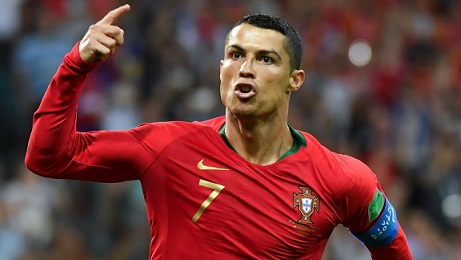 At the tournament proper Portugal’s main man had something special in store. The Seleção’s World Cup 2018 opener against Spain is another contender for Ronaldo’s best ever game for his country. The Iberian neighbours served up an exhilarating encounter, with Ronaldo twice putting Portugal into the lead as Fernando Santos’s men played some wonderful counter-attacking football. Spain came roaring back in the second half, turning around the result and seemingly headed for victory, until Portugal were awarded a free kick in the 88th minute. There was only ever going to be one man stepping up, and captain Ronaldo produced a quite stunning shot up and over the wall to earn the Portuguese a point.
At the tournament proper Portugal’s main man had something special in store. The Seleção’s World Cup 2018 opener against Spain is another contender for Ronaldo’s best ever game for his country. The Iberian neighbours served up an exhilarating encounter, with Ronaldo twice putting Portugal into the lead as Fernando Santos’s men played some wonderful counter-attacking football. Spain came roaring back in the second half, turning around the result and seemingly headed for victory, until Portugal were awarded a free kick in the 88th minute. There was only ever going to be one man stepping up, and captain Ronaldo produced a quite stunning shot up and over the wall to earn the Portuguese a point.
Ronaldo’s early header was enough for victory in the next game against Morocco, before a controversial draw against Iran. Ronaldo missed a penalty and was the subject of a red card VAR review as a dubious penalty enabled the Iranians to snatch a draw, and the bad blood between Iran coach Carlos Queiroz and several of the Portuguese players came to the fore after the final whistle. Portugal had made it to the knockout phase but were clearly far from their best, and a brace by Edinson Cavani saw Uruguay condemn the Seleção to a disappointing round-of-16 defeat.
That Winning Feeling: Inaugural Nations League Victors – 2019
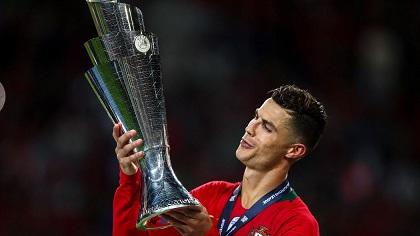 Between the World Cup and the start of qualification for Euro 2020, UEFA introduced a new tournament. The Nations League had initially been greeted with scepticism by fans and the media but the exciting group stages – which Ronaldo sat out of – went some way to changing perceptions as meaningful encounters rather than friendly games led to some enthralling matches right through the entire pyramid of league tables. At the top end, the Seleção were joined by Switzerland, Netherlands and England for the final-four tournament, which would be hosted in Portugal in the northern cities of Porto and Guimarães.
Between the World Cup and the start of qualification for Euro 2020, UEFA introduced a new tournament. The Nations League had initially been greeted with scepticism by fans and the media but the exciting group stages – which Ronaldo sat out of – went some way to changing perceptions as meaningful encounters rather than friendly games led to some enthralling matches right through the entire pyramid of league tables. At the top end, the Seleção were joined by Switzerland, Netherlands and England for the final-four tournament, which would be hosted in Portugal in the northern cities of Porto and Guimarães.
Ronaldo’s first match in the Nations League was therefore the semi-final, against Switzerland at the Estádio do Dragão, and the captain wasted no time imprinting his name on the new competition. The Swiss matched the hosts for most of the match, and the difference-maker was once again CR7, bagging a wonderful hat-trick to propel Portugal to the final. His late brace, a first-time shot on the run from the top of the box, followed by a trademark cut inside from the left and curling shot into the far corner, contradicted notions that Ronaldo was finally on the wane. Four days later and the Portugal captain and the nation were celebrating conquering Europe for the second time in three years after beating the Netherlands 1-0 in the final.
Euro 2020: Ageless Ronaldo Continues To Be A Goal Machine
The appointment of Fernando Santos seemed to have done away with Portugal’s traditional travails when it came to tournament qualifying, the doughty coach serenely negotiating his first two qualifying campaigns. Unfortunately, Euro 2020 saw a return to the bumpy ride that has characterised Portugal’s attempts to reach Euros and World Cups, albeit with a 100% successful outcome since the year 2000. One thing does not change though. Cristiano Ronaldo’s metronomic scoring rate for his national team remains unaffected by the side’s ups and downs. 11 goals in eight Group B matches saw Ronaldo edge ever closer to his century of international goals. Lithuania in particular will be glad to see the back of the Portugal captain after Ronaldo scored seven goals in the two ties against the Baltic state.
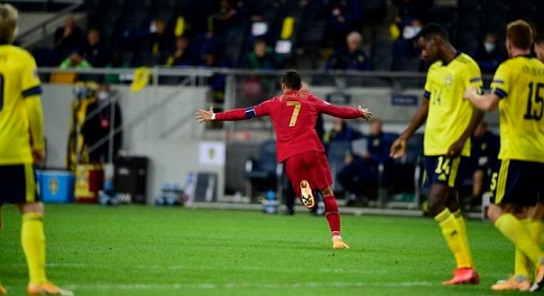 By the time Euro 2020 – postponed a year due to the Coronavirus pandemic – was staged, Ronaldo was 36 years old, yet his continuing efficacy in front of goal in the continent-wide edition of the European championship only firmed up the notion that we are talking about one of the greatest footballers of all time. Fresh from reaching a century of goals for the Seleção, Ronaldo led his country’s defence of its crown as European Champions, hungry as ever to add more silverware and glory to a fact-greater-than-fiction career.
By the time Euro 2020 – postponed a year due to the Coronavirus pandemic – was staged, Ronaldo was 36 years old, yet his continuing efficacy in front of goal in the continent-wide edition of the European championship only firmed up the notion that we are talking about one of the greatest footballers of all time. Fresh from reaching a century of goals for the Seleção, Ronaldo led his country’s defence of its crown as European Champions, hungry as ever to add more silverware and glory to a fact-greater-than-fiction career.
Hopes were high that Portugal would make a strong fist of defending their crown, especially as the squad was furnished with more talent than the one which had actually lifted the trophy five years earlier, with the likes of Bruno Fernandes, Bernardo Silva, João Félix, Diogo Jota and Rúben Dias having established their reputations as top-class players in the world’s biggest clubs. Alas, the Seleção had a forgettable tournament, winning only their opening match against Hungary and falling in the round-of-16 after a narrow 1-0 defeat to Belgium. Most of the aforementioned new generation of Portuguese stars were off their game, but the captain did not disappoint. Ronaldo’s five goals in the three group matches were enough to see him finish the competition as the joint top scorer. His ice-cool conversion of two penalties in a thrilling 2-2 draw against World Champions France averted a group stage exit for the Seleção, but that was as good as it got for Portugal.
World Cup 2022
Ronaldo had serenely ticked off more records at Euro 2020 - most appearances and most goals in European championships - and was now standing on the precipice of a hugely significant one. As ever, he did not waste time achieving it. In the very first match after the Euros, Portugal continued their poor form and seemed set for a shock home defeat against the Republic of Ireland in the Algarve. But when your captain is called Cristiano Ronaldo, you always have more than half a chance. Two trademark headers in the 89th and 95th minute turned an impending 1-0 defeat into a 2-1 victory and crowned Cristiano Ronaldo as the highest international goalscorer of all time.
📹🥅 𝘉𝘌𝘏𝘐𝘕𝘋 𝘛𝘏𝘌 𝘎𝘖𝘈𝘓.
— Portugal (@selecaoportugal) September 3, 2021
Os dois golos de @Cristiano como ainda não viste... 👀 #TeamPortugal #VamosComTudo #Cristiano pic.twitter.com/cuDu9QI85i
Cristiano Ronaldo’s Portugal career in numbers
|
Year |
Games |
Goals |
|
2003 |
2 |
0 |
|
2004 |
16 |
7 |
|
2005 |
11 |
2 |
|
2006 |
14 |
6 |
|
2007 |
10 |
5 |
|
2008 |
8 |
1 |
|
2009 |
7 |
1 |
|
2010 |
11 |
3 |
|
2011 |
8 |
7 |
|
2012 |
13 |
5 |
|
2013 |
9 |
10 |
|
2014 |
9 |
5 |
|
2015 |
5 |
3 |
|
2016 |
13 |
13 |
|
2017 |
11 |
11 |
|
2018 |
7 |
6 |
|
2019 |
10 |
14 |
|
2020 |
6 |
3 |
|
2021* |
10 |
9 |
|
Total* |
180 |
111 |
* As of 08/09/2021
[By Tom Kundert. First published on 08/09/2020. This article is part of the "The PortuGOAL files" series and will be updated on a regular basis]

